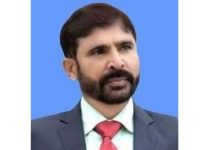By Mubasshar Ahmed Bhatti
In month of June, 2015 the Republic of Azerbaijan hosted first ever European Games. The country with overwhelming Muslim majority population brought together more than 6000 European athletes. Thousands of sport fans and tourists from all over the world got mesmerised with beauty of capital city Baku and other spots of Azerbaijan. And the fact that Azerbaijani team stood second in the Olympics was another surprise.
24 years back, this scene would have looked a dream. In the early years of independence Azerbaijan experienced tremendous difficulties as it was beset by both economic and political crises. A flood of refugees and IDPs as a result of Armenian aggression, ruined economy, and an atmosphere of apathy and hopelessness had left few who could believe in a bright future for this country.
Today Azerbaijan happens to be a respected member of the international community, playing a very positive role on the regional scale. All initiatives of the country are aimed at strengthening of regional cooperation. Political, economic issues related to energy security, obviously, are in the centre of attention in the country rich of hydrocarbons. Azerbaijan is playing an important role for the energy security of Europe and connecting Europe and Asia, actually restoring historical Silk Road with the new technologies. This is not only investment to the economic development and in better transportation facilities, but also in people-to-people contacts.
At the same time, the role which is played by this country on the international arena is also appreciated by the international community. In a very short period of independence Azerbaijan managed to be elected to the United Nations Security Council – the highest international body – with the support of 155 countries.
The Azerbaijani leadership showed acumen and political sagacity by implementing political and economic reforms in parallel. There was a clear realization that energy resources will not be sufficient to transform the country and provide sustainable development. Therefore, political reforms, issues related to democratic process and freedoms were in the centre of attention. Today, all the fundamental freedoms are provided in Azerbaijan – political freedoms, freedoms of media, free Internet, freedom of religion.
A calculated economic policy based on natural resources and potential of Azerbaijan made a miracle. Having a very low foreign debt – only around 10 percent of GDP- Azerbaijan does not depend on donors, sponsors, even donations and financial assistance from international financial institutions. The country managed to achieve, to the maximum degree, energy security of the country and even ensuring the energy security of others.
The credit for all these reforms obviously goes to the national leader of Azerbaijan Mr. Heydar Aliyev and his successor Mr. Ilham Aliyev. It would therefore be very interesting to review the reforms of President Aliyev, especially given that these reforms were implemented in the country where the interests of many global and regional players clashes.
Under the leadership of President Ilham Aliyev, Azerbaijan has become a leading power in Transcaucasia and undeniably Azerbaijan has developed remarkably in all sectors during the 12 years of his presidential tenure. According to Davos Economic Forum, Azerbaijan’s economy stands number 38 with respect to global competitiveness.

Mr. lham Aliyev started his political career in 1995 having been elected a member of the Milli Majlis (the National Assembly) and advancing to lead the Azerbaijani delegation at the Council of Europe. In 2003, 2008 and 2013 respectively Ilham Aliyev won the presidential elections with overwhelming majority.
Mr. I.Aliyev was instrumental in signing in 1994 the “Contract of Century” for exploration of hydrocarbon offshore reserves of the Caspian Sea. This deal paved a way to the renaissance of Azerbaijan.
The hydrocarbons are transported through pipeline network systems like Baku-Tbilisi-Ceyhan, Baku-Tbilisi-Erzurum, Baku-Supsa. Implementation of two ongoing projects, the Trans Anatolian (TANAP) and Trans-Adriatic (TAP) pipelines, will provide direct delivery of Azerbaijani gas to Europe.
Implementation of oil projects fetched billions in foreign exchange. The increase in gas production transformed Azerbaijan from a gas importing country into a gas exporter. Following a long term strategy, the revenues from energy-related activities are collected in a Oil Fund and these revenues are subsequently used for economic diversification. The launching of the first Azerbaijani satellite “Azerspace-1” into orbit, establishment of the Trans-Eurasian information corridor, vast development in agriculture, alternate energy projects, foundation of industrial zones are just some examples of the innovation in the non-oil sector.
A lot was achieved in the field of transport and communications. The number of international airports increased to 6 and the fleet of national flag carrier AZAL and marine transport were fully renewed. The completion of the Baku-Tbilisi-Kars railway link project will facilitate the transportation of goods and passengers from Central Asia via Azerbaijan to Europe making the country a transport hub for the region. The country is also an integral part of another important global project- Silk Road Economic Belt –the initiative of China aiming to connect East and West.
President I. Aliyev always paid great attention to the humanitarian sphere. Today Azerbaijan is a country with one of the lowest rates of poverty and unemployment in the world. It is around 5 percent. And, of course, this creates positive dynamics in the society. The development of science, education, healthcare, culture and sports in Azerbaijan contributes to the development of the entire humanitarian sector. The investment made in education and science in Azerbaijan is giving results. The thesis of “transforming black gold into human capital” that was put forward a few years ago is already a reality. Thousands of Azerbaijani youngsters are receiving an education in leading universities around the world. At the same time, specific programmes to develop science and attract young people to this field are being implemented.
Azerbaijan is situated on the crossroads of civilizations, cultures, religions-just between Europe and Asia. Indeed, this geographical location played a key role in cultural diversity of Azerbaijan. For centuries, representatives of all the cultures, religions, ethnicities have lived in Azerbaijan in peace, harmony, in dignity as one family. And as Mr. Ilham Aliyev proudly said at the opening of the 3rd World Forum on Intercultural Dialogue held recently in Baku – “during the years of independence these positive tendencies became even stronger”.
As a result of the growing political prestige of the country, Azerbaijan hosted and will host a number of international mega events. In addition of the European Games, the Eurovision 2012, World Chess Cup 2015, “Formula 1 Grand Prix Baku” 2016, Women World Cup-17, Islamic Solidarity Games 2017 and few matches of Football Europe Cup 2020 as well as some other events are in the list.
It is very unfortunate that the bleeding wound of Azerbaijan-the Armenia-Azerbaijan Nagorno-Karabakh conflict still remains unhealed. The internationally recognized territories of Azerbaijan are still under occupation for many years. This is a major humanitarian disaster as one million Azerbaijani citizens are living in their own homeland as refugees and IDPs. Azerbaijan has been exposed to a policy of ethnic cleansing, and as a result has suffered both material and moral damage. President Ilham Aliyev is committed to resolve this issue by all means, applying efforts in diplomatic field as well as strengthening defence capacity. The high rating of President Ilham Aliyev was once again endorsed during the November 2015 National Elections when the ruling party got majority of seats to the Parliament.
A leader with broad vision, Mr. Ilham Aliyev stresses on the dynamism of external relations of the state. He takes a keen interest in promoting the bilateral relations between Pakistan and Azerbaijan. Today the two nations enjoy close and cordial relations characterized by a shared perspective on major global and regional issues. Both countries closely cooperate in international forums and support each other on core issues to which end both countries have signed a number of agreements to provide a framework for bilateral cooperation in all walks of life.
The recent visit of President of Pakistan Mamnoon Hussain to Azerbaijan gave a new impetus to the dynamism of these relations. No doubt, the number of documents signed in different fields as well as the Business Forum held in the framework of the visit and that brought together the leading business circles of both countries will contribute to further deepening of relations between the two countries.
And it is worth mentioning that conferment of Mrs. Mehriban Aliyva, First Lady of Azerbaijan and the President of Heydar Aliyev Foundation the highest civil order of Pakistan “Hilal-e-Pakistan” was a unique message of acknowledgement and love from Pakistani people to their Azerbaijani friends.
The author is Executive Editor of Centreline and Diplomatic News Agency (DNA)












